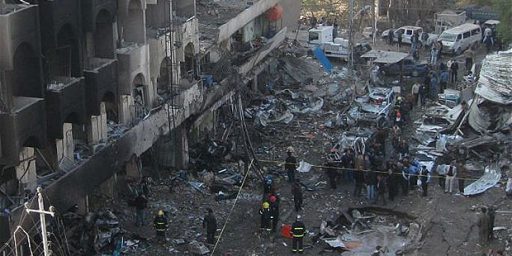Iraqis Near Oil Revenue Distribution Deal
The major factions are close to a deal on the incredibly divisive issue of sharing oil revenues.
Iraqi officials are near agreement on a national oil law that would give the central government the power to distribute current and future oil revenues to the provinces or regions, based on their population, Iraqi and American officials say.
If enacted, the measure, drafted by a committee of politicians and ministers, could help resolve a highly divisive issue that has consistently blocked efforts to reconcile the country’s feuding ethnic and sectarian factions. Sunni Arabs, who lead the insurgency, have opposed the idea of regional autonomy for fear that they would be deprived of a fair share of the country’s oil wealth, which is concentrated in the Shiite south and Kurdish north.
The Iraq Study Group report stressed that an oil law guaranteeing an equitable distribution of revenues was crucial to the process of national reconciliation, and thus to ending the war. Without such a law, it would also be impossible for Iraq to attract the foreign investment it desperately needs to bolster its oil industry.
Officials cautioned that this was only a draft agreement, and that it could still be undermined by the ethnic and sectarian squabbling that has jeopardized other political talks. The Iraqi Constitution, for example, was stalled for weeks over small wording conflicts, and its measures are often meaningless in the chaos and violence in Iraq today.
Given the climate, “could still be undermined” should probably say “will likely be undermined.” The guerrillas have a huge stake in making sure this does not work out and it is far easier to maintain anarchy than create and maintain stability.
Still, this is a hopeful sign, for a change. The mere fact that leaders think it worth sitting down and resolving issues through political means is important.
Thomas Barnett, hardly a Polyanna on this war, sees at least a glimmer of hope here:
So long as the sectarian violence flares, there will be a natural tendency for the three groups to pull apart, especially the two stable ones (Kurds, Shiia) from the one unstable one (Sunni triangle). But this law may just be enough to help give the central government just enough reason to remain relevant in the meantime that, as things settle down over time, Iraq can survive the inevitable bloodletting that comes after you take the dictator down who had held the nation together through institutionalized violence.
A lot of caveats, to be sure.




What has puzzled me nearly from the moment that we invaded Iraq has been what possible incentives would there be for the Sunni Arabs to take part in the political process and abandon resistance to the new Iraqi government. I suppose we can hope but I see no scheme based on population as achieving that: those hoping to restore the old system want more than their numbers would warrant not as much as their numbers would warrant.
A revenue-sharing system is as better deal for Sunni Arabs than the sort of regional system that the Kurds would prefer. If Kirkuk is allocated to Iraqi Kurdistan rather than to the mostly Sunni Arab in the west of Iraq, the Sunni Arabs of western Iraq would be cut out in such a system.